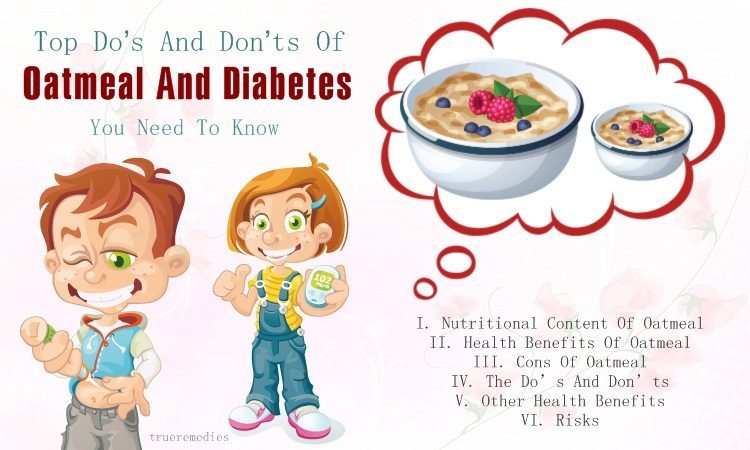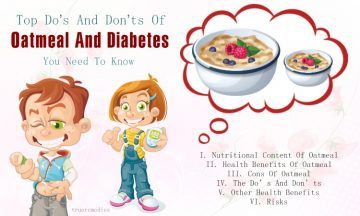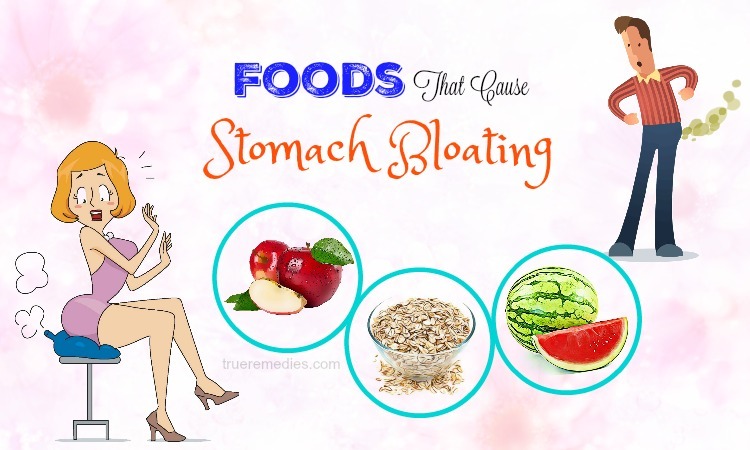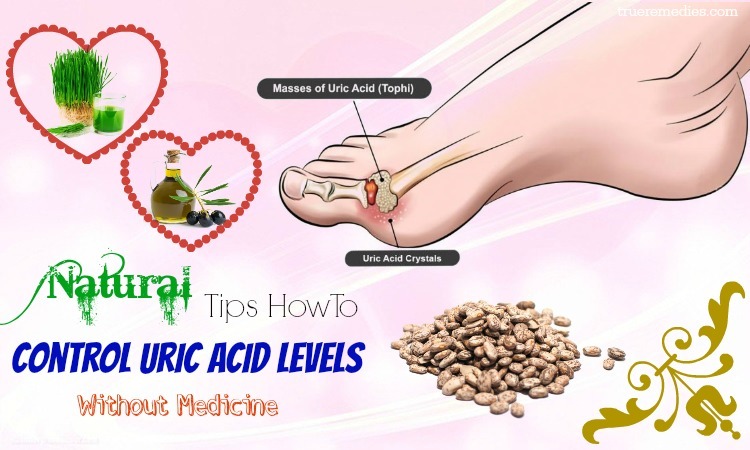Table Of Contents
Those with diabetes have difficulty in using or producing insulin. When controlling blood sugar, it is important to be aware of foods rich in carbohydrates because carbs directly impact blood sugar. These foods high in carbohydrates quickly break down into glucose. This could cause insulin and glucose spikes in the blood. Thus, people with diabetes usually seek out alternatives to carbohydrate-rich cereals. Oatmeal is one of the best options for you. Oatmeal is beneficial for maintaining glucose levels because it has a low glycemic index. Oatmeal, compared to other carb-rich grains, can be useful for those with diabetes. It can also enhance heart health, as people with diabetes are often prone to heart disease. Let’s find out the do’s and don’ts of oatmeal and diabetes on True Remedies.
Top 9 Do’s And Don’ts Of Oatmeal And Diabetes You Need To Know
I. Nutritional Content Of Oatmeal
½ cups of oatmeal has the following nutrient profile[1]:
- total fiber: 8 g
- calories: 304
- fats: 5 g
- protein: 13 g
- carbohydrates: 52 g
It additionally consists of helpful minerals, such as:
- iron: 4 mg
- calcium: 42 milligrams (mg)
- zinc: 3 mg
- magnesium: 138 mg
- potassium: 335
- phosphorous: 408 mg
Apart from that, oatmeal is naturally low in sugars and sodium. As these numbers show, oats are still mostly a source of carbohydrates. However, around 8 of these grams are the form of dietary fiber that may help to inhibit spikes of sugar in the blood. It’s still important to eat oatmeal in moderation and ensure a meal plan that is suitable for diabetes.
II. Health Benefits Of Oatmeal For Diabetes
Even though oatmeal is a high-carb food, it might have a few benefits for people with diabetes.
Reduce Blood Sugar: Oatmeal has specific types of fibers known as beta-glucans. According to a systematic review, eating beta-glucans may help decrease blood glucose levels in those with diabetes[2]. It also helps blood sugar levels attain normal levels.
TrueRemedies Partner Solutions

Need a Help from the Leading Expert Online, Available 24/7?
They’re all here and ready to answer your questions online or by phone. Keep asking questions until you get the answer you need.
Low GI Score
The GI (glycemic index) is a way to help estimate how foods will increase blood sugar. Foods with lower GI scores are effective at keeping blood glucose stable. They will not raise blood sugar. Oat foods such as muesli and oatmeal made from rolled or steel-cut oats are low-GI foods.
Heart Healthy
Diabetic patients may need ways to manage other issues, including high cholesterol. Oatmeal may be useful for them due to its healthy beta-glucans. According to a study, including about three grams of beta-glucans from oats in the diet may help lower bad cholesterol levels and keep good cholesterol levels[3].
Fiber-Rich
Dietary fiber may help lower the breakdown of sugars in your body. This may help inhibit spikes in blood sugar and insulin levels[4]. Consuming fiber-rich foods such as oatmeal during the day may help keep the blood sugar stable.
Temporary Raise In Insulin Sensitivity
In each meal, consuming oats may help to improve insulin sensitivity. A systematic review showed that people with type 2 diabetes who consumed a meal of oats had a better insulin and glucose response than people who consumed a similar control meal[5].
III. Cons Of Oatmeal For Diabetes
Eating oatmeal doesn’t have many cons for most of those with diabetes. If you select to eat certain versions of oats that are instant, laden with sugar and artificial flavoring, or eat too much at one time, eating oats may become a concern. For people who have gastroparesis and diabetes, the fiber in oats can be harmful. In general, if you have diabetes, but you don’t suffer from gastroparesis, the biggest cons of including oats in your diet include:
- Flatulence because of the fiber content: Consuming water while eating can help to lower flatulence.
- Bloating due to the high content of fiber: This can be decreased by drinking water when you eat.
- Buying instant packets that have extra sugar, added flavorings, or sweetener or adding other ingredients to the instant oatmeal can be not good to a diabetes diet.
IV. The Do’s And Don’ts Of Oatmeal And Diabetes
When including oatmeal in your diabetes diet, you need to pay attention to several things as follows:
The Do's
- Add berries, nuts or cinnamon
- Use water or low-fat milk
- Opt for Irish or steel-cut oatmeal
When eating oatmeal, here is what you should do:
- Add berries: Berries are rich in the right nutrients and antioxidants[6] and can function as a natural sweetener. They may also guard your cells against high blood glucose levels, help reduce blood sugar, and increase insulin sensitivity[7] [8] [9].
- Choose steel-cut or Irish oats: Steel-cut and Irish oatmeal both are abundant in soluble fiber, which is beneficial for regulating blood sugar and slowing digestion.
- Use water, low-fat dairy, or unsweetened plant-based milk: Using plant-based or low-fat milk can help raise nutrients without overeating fat. Water is preferable to higher fat milk or cream for those who are trying to decrease the fat content.
- Eat it with a healthy fat or protein such as Greek yogurt, eggs, or nuts. Adding 1 to 2 tablespoons of walnuts, almonds or chopped pecans can help to add healthy fat and protein, which can further aid in stabilizing your blood sugar.
- Use cinnamon: Cinnamon is packed with antioxidants, contains anti-inflammatory agents, and may help lower the risk of heart disease[10]. In addition to this, it is useful for improving sensitivity to insulin and may also help decrease blood sugar levels[11].
The Don'ts
- Don’t use cream
- Don’t add too much sweetener or dried fruit
- Don’t use instant or prepackaged oatmeal
When eating oats, here is what you should not do:
- Don’t add too much-dried fruit: Just one tablespoon of dried fruit contains a high amount of carbohydrates. Dried fruit is also packed with sugar and calories, including both fructose and glucose. Taking a lot of fructose may have adverse health effects, including increased risk of type 2 diabetes, weight gain, and heart disease[12].
- Avoid or limit using the cream: Use either plant-based milk, low-fat milk, or water to make oatmeal.
- Don’t add too much sweetener: People often add syrup, sugar, honey or brown sugar to oats. This decreases the health advantages oatmeal offers you.
- Don’t use instant or prepackaged oatmeal with added sweeteners: Flavored and instant oatmeal embrace added salt and sugar. Neither is good for your diabetes diet. Besides, they have less soluble fiber. Thus, opt for a healthy variety of oatmeal.
V. Other Health Benefits Of Oats
Apart from improving the heart-health and blood sugar, oatmeal can help with:
- skin protection
- weight management
- lowering cholesterol
- reducing the risks of colon cancer
Unsweetened and unprocessed oats are slow to digest, so it will make you feel full longer. This can aid in weight management and weight loss goals. Along with that, it can help regulate the pH of the skin, which can soothe itching and relieve inflammation.
VI. Risks Of Oatmeal
The risks of eating oats are mostly minor, but you should be aware of a few things when opting for them, including:
- Minor side effects: Too much fiber may lead to minor side effects such as bloated stomach and gas.
- Still high in carbs: Oats are still rich in carbohydrates, so diabetic patients should eat it in moderation.
- Allergies: Some oatmeal can be contaminated with wheat gluten and other flours. People with potential allergens should search for certified gluten-free oatmeal.
- Gastroparesis: Those with gastroparesis can want to avoid oatmeal because it can make symptoms of their issue worse.
- Added ingredients: Oatmeal and muesli with added ingredients may be not good for those with diabetes, particularly if they contain added sugars and dried fruits. Always check the labels and look for whole grain oats.
By selecting the right add-ins, oats can be a great breakfast when you are living with diabetes. Plus, make sure to monitor your blood sugar to notice how oats affect you. If you know other do’s and don’ts of oatmeal and diabetes, feel free to tell with us by commenting in the box below. There are also many useful and informative articles on our site, visit our main News & Facts to read more.
Read more: 10 Best Home Remedies For Bacterial Infection In Throat & Mouth. This article was medically reviewed/fact checked by Dr. Myle Akshay Kiran & Dr. Millie Lytle, ND, MPH.









